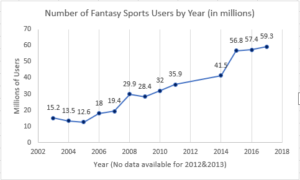Betting and gambling are inherently based on chance, luck, and uncertainty. Because uncertainty is difficult to measure, and we cannot predict the future with one hundred percent accuracy, gambling on an outcome is exciting because no one knows what will happen. So, many people enjoy the thrill. In fact, the betting industry is a multi-billion-dollar industry in the countries of the world where it is legalized. The American Gaming Association estimates that in the United States, whose Supreme Court just struck down an important law making it illegal for states to regulate and allow sports betting, $150 billion is spent on illegal gambling each year. The Professional and Amateur Sports Protection Act (PASPA) was a federal law that essentially restricted sports betting to Nevada for a quarter of a century. And with PAPSA struck down, the American market is poised to become the world’s largest legal gambling market.
Although for a long time betting and gambling was seen as a vice that should be completely outlawed, much like alcohol post-Prohibition it is coming mainstream. Attempts to deny access to it, as with alcohol, brought forth illegal and shady offshore operations. Now, states and Congress are viewing a healthy amount of sports betting as “a potential source of revenue more than a detriment to society,” according to industry experts. Additionally, the rise in daily fantasy sports – considered by many to be a form of betting – has captivated the country, with nearly one-fifth of the country now participating in fantasy sports.
[source: Fantasy Sports Trade Association]
The illegality of sports gambling in the United States (save in, famously, Nevada, as well as a couple of other states) led to the rise in offshore betting sites. They were not legal or sanctioned, yet many managed to evade regulators and lawmakers. They continue to have a head start on much of the industry in America. While that is currently an issue, because states are quickly moving to legalize and regulate the industry, and Congress is moving to pass legislation as well, the legal market should win out. NBA Commissioner Emeritus David Stern declares that “between five and 10 years” from now, we will see a massive, regulated, fully online betting market in the United States.
The future legalized market in the United States could reshape the way sports teams and leagues operates, as well as create more experiences for fans to actually participate in, according to team owners and gambling experts. Leagues see the revenue from gambling bringing in billions of dollars, money that will modify the way teams market and provide services to fans; this additional revenue could cause salary caps and team payrolls to explode as well. Already, the Pittsburgh Pirates’ executives have argued that states should allocate sports-gambling revenues to stadium building.
According to Chris Eaton, an integrity monitor and former INTERPOL investigator, “In 10 years’ time … I see the large international conglomerates — Bloomberg, Google, the massive data companies — swallowing up most of the sports betting operations around the world and operating an international platform, with all of sports betting being essentially offered on the mobile device, the mobile platform.”
The large technology corporations are already seeking to implement their services into the betting industry. In the past decade “Google, Yahoo, Microsoft and others in the technology sector made written filings to the Commodity Futures Trading Commission (CFTC) in support of expanding so-called prediction markets into the public sphere.” This opportunity to enter a new market will not only boost revenues for the companies that are prepared, have a first-mover advantage or own large name recognition, but will also provide them with even more data.
Lawmakers and companies need to ensure this data is used efficiently and with respect for privacy; that the athletes are not taken advantage of vis-a-vis point shaving; and that gambling is properly regulated and able to be enjoyed in moderation. That these issues will be firmly addressed, however, much like betting on an outcome, are no sure things; with billions of dollars and lives at stake, it will be fascinating to experience the future prominence of legalized gambling across the United States.

Leave a Reply
You must be logged in to post a comment.